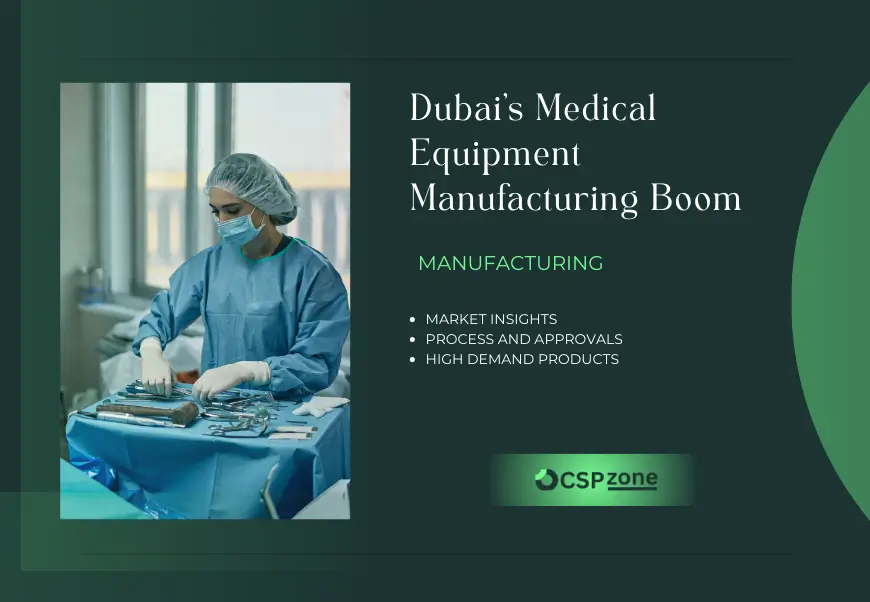


Imagine a market where demand keeps growing, regulations are supportive, and your products can reach over 2 billion consumers within a few hours. That market is Dubai for medical equipment manufacturing.
Over the past decade, Dubai has transformed itself into a strategic hub for high-quality medical device production. For foreign investors, it is not just an opportunity, it is a golden gateway.
In this article, CSPzone will guide you through the opportunities, market data, regulations, and step-by-step process of starting your own medical equipment manufacturing business in Dubai.
The global medical devices market is expected to cross 800 billion US dollars by 2030. The UAE’s share is expanding quickly because of its advanced healthcare infrastructure and government investment. Healthcare spending in the UAE is projected to reach 30 billion US dollars by 2030, with a significant part allocated to upgrading hospitals and clinics.
Dubai’s location is unmatched. Within a 4-hour flight, manufacturers can serve the Middle East, Africa, South Asia, and parts of Europe. Add to that world-class logistics like Jebel Ali Port and Dubai International Airport, and you have a supply chain advantage few places can match.
The Dubai Industrial Strategy 2030 lists medical technology and pharmaceutical manufacturing as key priority sectors. This means more access to incentives, faster approvals, and dedicated free zones for healthcare businesses. Foreign investors can own 100 percent of their companies in these zones, eliminating the need for a local partner.
CSPzone research shows strong demand for:
1. Surgical instruments for both hospitals and outpatient clinics
2. Diagnostic devices like portable ultrasound machines
3. Hospital furniture and patient beds
4. Personal protective equipment for healthcare staff
5. Home healthcare devices such as oxygen concentrators and mobility aids
A growing trend is portable and home-use medical equipment because of the rise in elderly care and remote monitoring.
Example from the USA: A mid-sized American surgical tools manufacturer expanded into Dubai in 2021 and now supplies GCC hospitals in under eight months from setup, with a 40 percent increase in export orders.
In the UAE, the Ministry of Health and Prevention (MOHAP) oversees medical device regulation. Every product must be registered before it can be sold. For manufacturers, this means:
1. Registering your facility with MOHAP
2. Getting product certifications and quality testing done locally
3. Complying with ISO standards for medical manufacturing
CSPzone ensures clients meet all these requirements without delays.
1. Choose your business structure – Decide between mainland or free zone based on your target market.
2. Select the right free zone – Some zones are healthcare-focused, offering faster medical product approvals.
3. Apply for your manufacturing license – Include all intended product categories.
4. Secure approvals from MOHAP – For both your facility and your products.
5. Set up your manufacturing facility – CSPzone helps find compliant, cost-effective spaces.
6. Hire qualified staff – Including biomedical engineers and technicians.
7. Start production and distribution – Use Dubai’s logistics to reach your target countries quickly.
Typical investment for a small to medium medical manufacturing setup ranges from 1 million AED (about 272,000 USD) upward, depending on scale.
CSPzone has years of experience setting up regulated businesses in Dubai. We guide you through licensing, facility compliance, product registration, and even help connect you with potential buyers in the GCC region. With our network, your business can be operational faster and positioned for long-term success.
Dubai offers a rare combination of market demand, supportive government policies, and global connectivity. For foreign investors in the medical equipment sector, it is not just a good market - it is the right market, right now. With CSPzone, you can turn your manufacturing vision into a thriving business in one of the fastest-growing healthcare economies in the world.